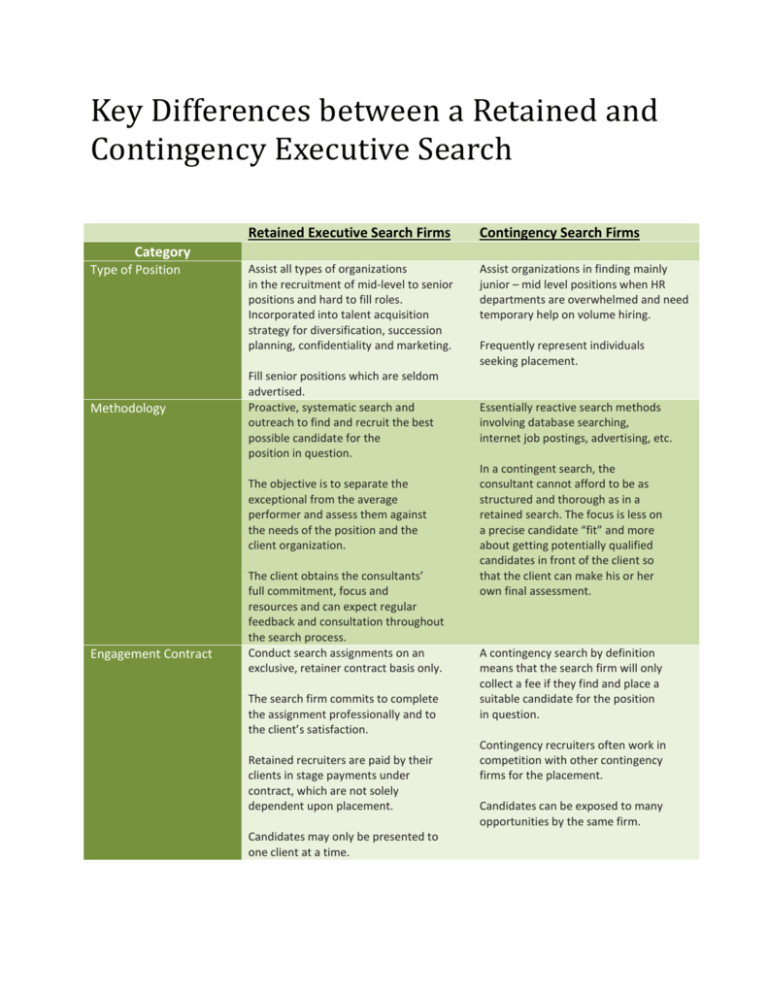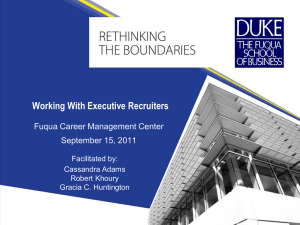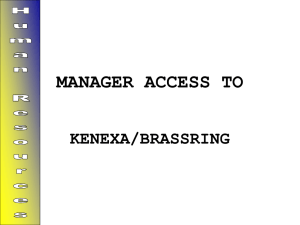Key Differences between a Retained and Contingency Executive
advertisement

Key Differences between a Retained and Contingency Executive Search Retained Executive Search Firms Contingency Search Firms Assist all types of organizations in the recruitment of mid-level to senior positions and hard to fill roles. Incorporated into talent acquisition strategy for diversification, succession planning, confidentiality and marketing. Assist organizations in finding mainly junior – mid level positions when HR departments are overwhelmed and need temporary help on volume hiring. Category Type of Position Methodology Fill senior positions which are seldom advertised. Proactive, systematic search and outreach to find and recruit the best possible candidate for the position in question. The objective is to separate the exceptional from the average performer and assess them against the needs of the position and the client organization. Engagement Contract The client obtains the consultants’ full commitment, focus and resources and can expect regular feedback and consultation throughout the search process. Conduct search assignments on an exclusive, retainer contract basis only. The search firm commits to complete the assignment professionally and to the client’s satisfaction. Retained recruiters are paid by their clients in stage payments under contract, which are not solely dependent upon placement. Candidates may only be presented to one client at a time. Frequently represent individuals seeking placement. Essentially reactive search methods involving database searching, internet job postings, advertising, etc. In a contingent search, the consultant cannot afford to be as structured and thorough as in a retained search. The focus is less on a precise candidate “fit” and more about getting potentially qualified candidates in front of the client so that the client can make his or her own final assessment. A contingency search by definition means that the search firm will only collect a fee if they find and place a suitable candidate for the position in question. Contingency recruiters often work in competition with other contingency firms for the placement. Candidates can be exposed to many opportunities by the same firm. Nature of the Collaboration Fee Payment Consultant’s Work Retained Executive Search Firms Contingency Search Firms Recruiting process is consultative, research-based and solution oriented. Recruiting process is transactional and placement oriented. The consultant spends considerable time getting to know the client organization, position responsibility and all requirements before initiating the search. With no guarantee of payment for services performed, the consultant cannot afford to invest much time in a search beyond basic recruiting and submission of resumes. The consultant provides regular feedback to management on the market perception of their organization, on compensation levels and other issues that can affect their ability to recruit the best candidate. Charge a retainer fee which is assignment rather than placement based. Charge a fee only upon successful placement of a candidate. Successful assignment completion may be achieved even by internal appointment. Fees are typically a percentage of compensation and are paid on the successful placement of the candidate (“No cure, no pay”). Fees are normally a percentage of compensation or are fixed in advance and are paid in installments by the client during the search process. Must know client organization and position responsibility/requirements thoroughly before initiating the search. Search consultant often works concurrently with a multitude of open job orders. A retained search consultant normally handles no more than 3-5 assignments at any given time and is responsible for the success or failure of each. Their primary task is to present resumes/CVs in the hope that one will be successful. Key success factor is speed. He/she typically invests 40-60 hours per month per client assignment in recruiting, valuation, screening and client interaction. Key success factor is quality. Research: From the Long List to a Short List Retained Executive Search Firms Contingency Search Firms Research is focused on a range of potential senior candidates, many of whom are currently employed in target companies and are not active in the job market. Candidates are presented quickly and randomly without full research of the market of employed candidates. A "long list" of potential candidates is drawn up and the most suitable are invited for a face-to-face interview with the consultant. Will present candidates within 1-2 weeks of obtaining job order for client to filter. May submit substantial numbers to increase probability of a placement. Usually recommends 3-5 highly qualified candidates to client company in 4-8 weeks. Consultant’s Background Additional Investment by the Client The number of candidates presented will depend on the characteristics of the job and on candidate availability. Retained search consultants are experienced professionals, often with successful careers in the line of work they place in or in management consulting. They are able to relate to client management and the candidate community. The retained search consultant is engaged to save time and effort on the part of management. He/she provides the client with comprehensive consulting and reporting (resume, references, interview, reports). This requires less Human Resources and General Management time investment until interview process begins. Search consultants in contingency firms often have less experienced business backgrounds. The client/hiring manager is most often flooded with resumes and is confronted with the challenging task of assessing them. Contingency search requires considerable Human Resource involvement in screening, interviewing and evaluating candidates presented. Ethics: Guarantee, Confidentiality, OffLimits, etc. Retained Executive Search Firms Contingency Search Firms All AESC members are retained consulting firms that abide by a strict Code of Conduct, Professional Practice Guidelines and Client’s and Candidate’s Bill of Rights. Contingency recruiting firms are under no contractual obligation to guarantee or produce results due to contingency fee arrangement (paid on placement only). Reputable firms offer a professional guarantee of candidate success (typically one year guarantee on the placement of the candidate) and are committed to thorough and ethical practices and results, including off-limits agreements with clients. Contingency search firms normally do not have off-limits constraints nor offer a professional guarantee exceeding 30-90 days. The search consultant helps close the negotiation with the chosen candidate who is exclusively presented to the client. Confidentiality is guaranteed as is compliance with data privacy laws, since all parties involved consent to the transfer and receipt of personal data. Cost vs. Risks This greatly reduces the risk of litigation. The costs of retaining an executive search firm, although sometimes higher than contingency, should be weighed against the potential costs of a hiring mistake. In addition, bring new talent that your own Human Resources team isn’t able to tap into under their recruitment practice. Candidates can be simultaneously presented to multiple organizations, often without their knowledge. Confidentiality and data privacy is at risk since consent by candidates for transfer of data is often not obtained, which creates potential conflicts and enhance legal exposure. As a contingency firm offers a service with no money up-front, they will often only work on those searches that can be executed quickly, and do not have the time to focus on passive high-quality candidates. A bad appointment to a crucial position can have detrimental consequences that can take much time and expenditure to recover from. With less time spent on securing a clear job description and understanding the client’s needs, the chance of a candidate/client mismatch is increased. Decision to partner with an executive search firm is quality-motivated. Decision to hire contingency firm is normally budgetary motivated. Source: In partnership with AESC





